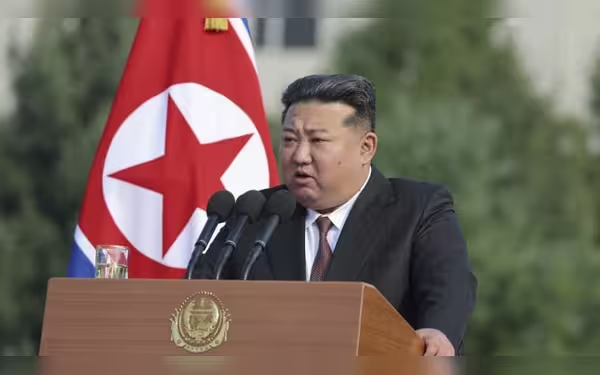Saturday, November 16, 2024 07:42 PM
Kim Jong Un's Security Meeting Amid Rising Tensions with South Korea
- Kim Jong Un calls for immediate military action.
- North Korea warns drone incursions equal declaration of war.
- South Korea claims readiness to respond to aggression.
 Image Credits: channelnewsasia
Image Credits: channelnewsasiaKim Jong Un convenes a security meeting, warning of military action amid escalating tensions with South Korea.
In recent times, tensions between North Korea and South Korea have escalated significantly, drawing the attention of the international community. The situation has become particularly alarming as North Korea's leader, Kim Jong Un, has taken decisive steps to address perceived threats from the South. On October 14, 2023, Kim convened a high-level national security meeting in Pyongyang, where he outlined plans for what he termed "immediate military action." This meeting included key military and security officials, highlighting the seriousness of the current climate.
During the meeting, Kim Jong Un emphasized the need for a robust response to what North Korea describes as provocations from South Korea. The Korean Central News Agency (KCNA) reported that Kim directed his officials to prepare for operations that would enhance the country's war deterrent capabilities and assert its right to self-defense. This comes in the wake of accusations from North Korea that South Korea has been flying drones over its capital and mobilizing troops near the border, actions that have been met with stern warnings from the North.
Kim's remarks reflect a hardened stance, as he expressed a "tough political and military stand" against what he perceives as threats. The North has labeled the drone flights as serious provocations, claiming that these drones dropped propaganda leaflets filled with "inflammatory rumors and rubbish." In a particularly alarming statement, North Korea warned that any further drone incursions would be viewed as "a declaration of war." This rhetoric underscores the fragile state of relations between the two Koreas.
On the other hand, South Korea has maintained that it is "fully ready" to respond to any aggression. Initially, South Korean military officials denied involvement in the drone flights, suggesting that activist groups within the South might be responsible for sending propaganda northward, typically using balloons. This adds another layer of complexity to the already tense situation.
The United Nations Command, which oversees the armistice that ended the Korean War in the early 1950s, has acknowledged North Korea's claims and is currently investigating the matter in accordance with the Armistice Agreement. This investigation is crucial, as it may help to de-escalate tensions and prevent further military confrontations.
As the situation unfolds, it is essential for both North and South Korea to engage in dialogue to avoid miscalculations that could lead to conflict. The international community is watching closely, as any military action could have far-reaching consequences not just for the Koreas, but for global peace and security. It is a reminder that in the realm of international relations, communication and understanding are key to maintaining stability.













